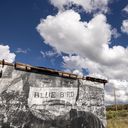Native American tribes say ICE harassing members amid raids
Some Native American tribes say tribal members are being harassed by federal immigration agents, while others fear they could be wrongly caught up in immigration raids.
Why it matters: The angst among some Indigenous tribes reflects the confusion and fear even among legal citizens during the Trump administration's immigration raids.
The big picture: Several tribes have issued warnings and advice to their members based on what they say have been encounters in which U.S. immigration agents have demanded proof of citizenship — episodes that the tribes have linked to racial profiling.
- The alarm comes as Immigration and Customs Enforcement (ICE) says its agents are arresting more than 1,000 undocumented immigrants a day, part of President Trump's push to deport "millions" of people not authorized to stay in the U.S.
- Immigration raids in cities such as Chicago and Los Angeles — and Trump's new directives to allow searches in schools and churches in addition to workplaces and homes — have heightened concerns in communities across the country.
Zoom in: The Navajo Nation, one of the nation's largest tribes, said federal immigration agents have been questioning its members.
- "My office has received multiple reports from Navajo citizens that they have had negative, and sometimes traumatizing, experiences with federal agents targeting undocumented immigrants," Navajo President Buu Nygren said in a statement.
- Navajo Nation officials told CNN on Monday that at least 15 Indigenous people in the southwestern U.S. have reported being questioned or detained by immigration officers in the past week.
- The 17.5 million-acre Navajo Nation is in northeastern Arizona, northwestern New Mexico, and southeastern Utah. It's larger than 10 states.
ICE offices in Utah and Washington, D.C., did not immediately respond to Axios' requests for comment.
Zoom out: The Mescalero Apache Tribe in New Mexico announced that a member was confronted by ICE agents last week and was asked for ID — first in Spanish, although the member spoke English.
- The Sisseton Wahpeton Oyate of the Lake Traverse Reservation in South Dakota said it was temporarily waiving all fees for issuing or replacing tribal IDs amid members' concerns about ICE encounters.
- Ute Indian Tribe Business Committee — the tribe's governing body — promised in a statement Saturday to "aggressively defend our rights and interests."
- The tribe offered legal counsel to members who are "improperly detained or questioned," as did the Paiute Indian Tribe of Utah.
The San Juan Southern Paiute Tribe, whose land crosses the Utah-Arizona border, advised its citizens to record encounters with ICE, ask for agents' badges and keep their doors closed and ask for a warrant if approached at home.
What they're saying: Trump's immigration executive orders have "raised concern among our tribal members, particularly regarding the potential targeting of our community by immigration agents," Chippewa Cree Tribe chairman Harat BaRete said in a statement.
- The north-central Montana tribe then released a set of guidelines urging members to remain silent, keep ID handy and report encounters to tribal officials.
- "The Rosebud Sioux Tribe is in the process of assessing the legal effects of the unlawful and unconstitutional Trump administration Executive Orders and will fiercely defend against any threat to the sovereignty," the South Dakota tribe said in a statement.
Between the lines: It's not unusual for ICE or DEA agents to enter tribal lands for immigration or drug enforcement.
- Since the Obama administration, U.S. agents have aggressively targeted human smuggling rings that use isolated Indigenous lands to try to move undetected.
Congress didn't grant citizenship to Native Americans until 1924 — a development President Trump's lawyers cited in their attempt to justify his temporarily blocked executive order to overturn birthright citizenship.
- The administration's attorneys last week invoked an 1884 U.S. Supreme Court ruling that denied citizenship to members of tribes to argue that "birth in the United States does not by itself entitle a person to citizenship."
- Some tribal leaders saw the argument as a threat against their members' U.S. citizenship.



